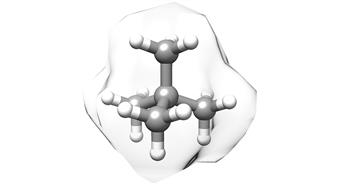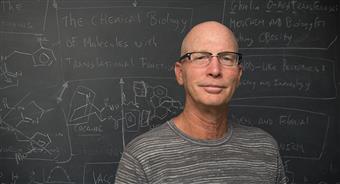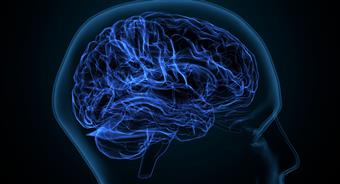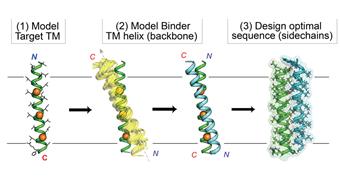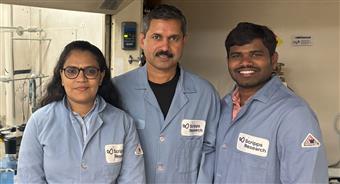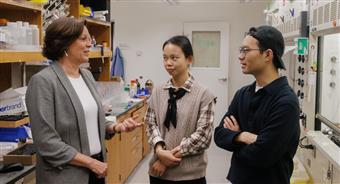
Scripps Research study reveals how alcohol cravings get stronger after drinking during withdrawal Findings in animal study could eventually lead to improved treatments to minimize cravings in people with alcohol use disorder.
May 02, 2022
LA JOLLA, CA For some people with alcohol use disorder, it might be the sight of a familiar bar or a favorite bottle; for others, it might be the feeling of leaving the office after a stressful day at work or stepping into a crowded party. Most people who struggle with drug or alcohol addiction have particular cues that set off their cravings.
Now, scientists at Scripps Research have discovered how, in rats dependent on alcohol, environmental cues that become associated with drinking during withdrawal are much more powerful than those learned during the early phases of alcohol use, leading to more irresistible cravings. The new findings, published online in the British Journal of Pharmacology, could eventually lead to new treatments to minimize cravings in people with addictions.
We already knew that the craving produced by environmental stimuli typically intensifies over time in severe alcohol use disorder, says Friedbert Weiss, PhD, a professor at Scripps Research, but no one had teased apart, at both a behavioral and neurobiological level, why that is until now.
An estimated 14.5 million people in the United States have alcohol use disorder, which encompasses a range of unhealthy drinking behaviors. Like other drug addictions, alcohol addiction is characterized by cycles of withdrawal, abstinence and relapse. Cravings set off by environmental stimuli like those present when driving past a local bar are powerful drivers for relapse. Similarly, rats that have learned to associate a particular smell with alcohol will seek out alcohol when exposed to the smell.
In the new work, Weiss and his colleagues sought to understand whether the experience of repeatedly drinking alcohol during withdrawal rather than just the length of time or severity of the addiction helps strengthen the learned associations that lead to cravings. They conditioned rats that were not dependent on alcohol to associate an anise or orange scent with alcohol. Then, a subset of those animals went through cycles of withdrawal, during which they were conditioned to associate a different scent with alcohol consumption.
This allowed us to separate, for the first time, the learning that happens during the original, non-dependent state, and the learning that happens during withdrawal, says Weiss.
When all the animals were then tested to see what lengths they would go to for alcohol in the presence of a conditioned scent, Weiss' group discovered that cues learned during withdrawal were far stronger at eliciting a reaction. In other words, the experience of learning how alcohol relieves negative withdrawal symptoms led to even stronger cravings than the original experience of learning alcohol's feel-good effects.
It is commonly thought that people drink because it makes them feel good. But in people who have developed dependence, the feel-good' sensation that the drug produces is actually a reversal of feeling terrible, says Weiss. When this reversal of feeling terrible is experienced repeatedly, then environmental cues that become associated with this experience produce a much more powerful craving than the initial feel-good' craving.
Rats that had learned to associate a scent with alcohol during withdrawal were much more persistent in the presence of that scent; during a 30-minute time period, they pressed a lever attempting to obtain alcohol twice as many times as animals that had only been conditioned during early alcohol drinking while not yet dependent. This persistence remained even when they received a small electric shock upon pressing the lever, or when the task of lever pressing was made increasingly more difficult.
If an alcoholic comes home from work and there's nothing in the refrigerator, what lengths will they go to for alcohol? Will they run next door to the liquor store? What if it's snowing outside and the store is a five-mile walk away? What we're seeing is that in rats, they'll work much harder to overcome obstacles and are willing to endure adverse consequences if they've been conditioned with cues during withdrawal, says Weiss.
Moreover, the team found that the new conditioning actually weakened older cues that had been learned before the animal became alcohol dependent. If an animal originally associated alcohol with an anise scent, but was later made dependent and conditioned to associate alcohol with an orange scent while drinking during withdrawal, the anise scent was no longer as strong a cue for setting off alcohol-seeking behaviors compared to the second scent that was associated with alcohol drinking during withdrawal.
The researchers then studied the amygdala, the part of the brain associated with drug and alcohol addiction in humans and rats, to see how it changed during each conditioning experiment. Different areas, they discovered, were activated depending on whether rats were learning a scent during initial alcohol exposure while not dependent, or during withdrawal after having been made dependent.
Identifying how learned associations between drug and environment are instantiated in the brain was the really exciting part of this paper for me, says one of the authors, Hermina Nedelescu, PhD, a Scripps Research staff scientist. Once we can narrow in on which circuits in the brain are responsible for this withdrawal-associated learning, we can start thinking about how to target them with therapeutics.
The group is now planning future experiments to more specifically identify the exact groups of neurons involved.
In addition to Weiss and Nedelescu, authors of the study, Compulsive Alcohol Seekin
More from Scripps
12/04/2024
Scripps Research chemists devise easier new method for making a common type of building block for drugs Scientists transform simple linear amines into saturated...
06/04/2024
A simple, inexpensive way to make carbon atoms bind together A Scripps Research team uncovers a cost-effective method for producing quaternary carbon molecules,...
04/04/2024
Developing a vaccine for the zombie drug xylazine Scripps Research chemical biologists design an early proof-of-concept vaccine that could lead to the first...
30/03/2024
How blocking a neural receptor responsible for addiction could reduce alcohol use A Scripps Research team found that a new therapeutic that targets the kappa op...
13/03/2024
New computational strategy boosts the ability of drug designers to target proteins inside the membrane Customized-design approach could streamline the design of...
29/02/2024
Scripps Research scientists reveal how first cells could have formed on Earth New phospholipid discovery brings researchers closer to understanding how primordi...
29/02/2024
How molecular handedness emerged in early biology Scripps Research chemists fill a major gap in origin-of-life theories.
February 28, 2024
LA JOLLA, CA Mole...
22/02/2024
Snaking toward a universal antivenom Scripps Research scientists discovered antibodies that protect against a host of lethal snake venoms.
February 21, 2024
...
06/02/2024
Calibr-Skaggs announces expansion of option and license agreement with AbbVie to develop novel cell therapies for solid tumors and autoimmune diseases
AbbVie...
26/01/2024
Re-energizing mitochondria to treat Alzheimer's disease Scripps Research team restored neuron-to-neuron connections in human cells.
January 25, 2024
LA JO...
24/01/2024
100 years of Science Changing Life: Scripps Research celebrates a century of transforming human health For the last century, institute leaders and renowned scie...
23/01/2024
New technology lets researchers track brain cells' off switches The method could shed light on what goes awry in numerous brain conditions when neurons ar...
09/01/2024
Three decades of giving: Announcing the Calibr-Skaggs Institute for Innovative Medicines The ALSAM Foundation, founded by the Skaggs family, provides lasting g...
04/01/2024
Life science entrepreneur Gene Lay joins Scripps Research Board of Directors Lay, founder of the global biotech company BioLegend, brings invaluable experience ...
21/12/2023
Taming a plant-derived toxin Scripps Research team modifies the traditional poison picrotoxinin for potential neurological drugs and anti-parasite treatments. ...
19/12/2023
Scripps Research Executive Vice President Eric Topol gives TED talk on transformative power of AI in medicine Topol provides an overview of how AI models can i...
13/12/2023
New AI-powered algorithm could better assess people's risk of common heart condition Early detection of atrial fibrillation can reduce the risk of stroke an...
07/12/2023
Nanoparticle flu vaccine design shows promise in early tests Scripps Research-designed vaccine could provide broad, enduring protection against influenza A str...
16/11/2023
Numerous Scripps Research scientists named Highly Cited Researchers Clarivate's annual, global list represents researchers who have demonstrated significant...
07/11/2023
Multiple sclerosis drug invented at Scripps Research slows long-term devastating disease progression Late-breaking data reinforces the effectiveness and safety ...
05/10/2023
Keren Lasker named a 2023 Moore Inventor Fellow The prestigious award will support Lasker's inventive research in membraneless organelles and their applica...
22/09/2023
Michael Bollong named a 2023 Amgen Young Investigator The prestigious award will support Bollong's research identifying new molecular targets and therapeuti...
09/09/2023
Philip Dawson receives 2024 American Chemical Society National Award Dawson is honored with the Arthur C. Cope Late Careers Scholar Award for his foundational c...
07/09/2023
Scripps Research chemists devise a method for C-H activation of alcohols The method represents a new toolkit for making drugs and other compounds.
September 06...
31/08/2023
Scripps Research receives $1.5M to surveil infectious disease threats in wastewater Bill & Melinda Gates Foundation award to support the development of multi-pa...
16/08/2023
How cold temperatures trigger the brain to boost appetite Scripps Research scientists' discovery could lead to new weight loss and metabolic health treatmen...
08/08/2023
Human antibody that targets carfentanil, fentanyl and related opioids reverses overdose effects in preclinical study Scripps Research-developed antibody therapy...
04/08/2023
How sensory neurons impact the gut Scripps Research scientists show that the receptor PIEZO2 in sensory neurons controls gut motility and transit time, which a...
26/07/2023
AbbVie and Calibr Expand Strategic Collaboration to Advance Several Preclinical and Early-stage Clinical Assets The expanded strategic collaboration will advan...
23/07/2023
Scripps Research scientists develop AI-based tracking and early-warning system for viral pandemics Machine-learning system effectively predicts emergence of pro...
19/07/2023
Monitoring T cells may allow prevention of type 1 diabetes Scripps Research study shows that analyzing T cells in blood samples could be used to select at-risk ...
19/07/2023
Scripps Research mourns passing of leading organic chemist Albert Eschenmoser Eschenmoser pioneered key reactions in synthetic chemistry and shaped the understa...
15/06/2023
Scripps Research awarded $46.8 million by NIH to promote human health through innovative translational science and training The Translational Institute is harne...
13/06/2023
Scripps Research's Danielle Grotjahn named 2023 Pew Scholar in the Biomedical Sciences The award will support Grotjahn's study of how cells assemble the...
31/05/2023
Crossing the ring: new method enables C-H activation across saturated carbocycles Scripps Research chemists add another powerful tool to their molecular editin...
24/05/2023
Scripps Research develops behind-the-scenes tool for better biomedical data discovery The new resource makes datasets more discoverable for life science communi...
19/05/2023
Scripps Research neuroscientist Hollis Cline elected to American Academy of Arts and Sciences Cline is recognized for her discoveries about the role of sensory ...
19/05/2023
Scripps Research's Skaggs Graduate School awards doctoral degrees to 31st graduating class Commencement ceremony will be livestreamed via Zoom and on instit...
13/05/2023
A better route to benzocyclobutenes, sought-after building blocks for drugs Scripps Research chemists devise a new, C-H activation-based method for the synthesi...
09/05/2023
Renowned Scripps Research professor Jeffery Kelly elected to National Academy of Sciences Kelly's groundbreaking work on protein misfolding has led to thera...
28/04/2023
Mirror-image molecules pave new path for cancer drug discovery By comparing how mirror image versions of small molecules impact clusters of proteins, Scripps R...
22/04/2023
How alcohol consumption contributes to chronic pain A Scripps Research team showed how both alcohol intake and alcohol withdrawal can lead to increased pain and...
21/04/2023
Xin Jin receives dual awards to study autism risk genes in neurodevelopment Major grants from the National Institutes of Health and California Institute for Reg...
20/04/2023
Trim the sugar: New HIV vaccine design improves immune response Scripps Research vaccine candidate headed for clinical trials.
April 19, 2023
LA JOLLA, CA A...
18/04/2023
Therapeutic can seek and destroy potent opioid to treat overdoses Scripps Research chemists developed a new biologic to work against the synthetic opioid carfen...
07/03/2023
How heavy alcohol consumption increases brain inflammation The findings by a Scripps Research team point toward a potential new drug target for treating alcohol...
02/03/2023
Scientists find human antibodies that can block multiple coronaviruses including SARS-CoV-2 Results from a Scripps Research and UNC team pave the way for a vacc...
28/02/2023
$10 million grant funds Scripps Research Alcohol Research Center through its 50th year The five-year grant supports research into the neurobiology of alcohol us...
28/02/2023
Immune system drug shows promise in treating alcohol use disorder, a Scripps Research clinical trial reports Scientists at Scripps Research found that apremilas...
23/02/2023
Chemically poisoned protein acts as a molecular switch to spur cancer formation The discovery triggered development of a new potential drug to eliminate tumor...
 Scripps Research study reveals how alcohol cravings get stronger after drinking during withdrawal Findings in animal study could eventually lead to improved treatments to minimize cravings in people with alcohol use disorder.
Scripps Research study reveals how alcohol cravings get stronger after drinking during withdrawal Findings in animal study could eventually lead to improved treatments to minimize cravings in people with alcohol use disorder.














